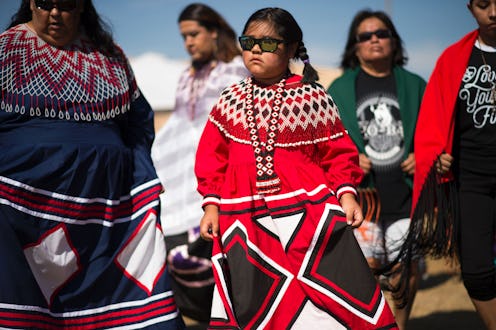News
The DAPL Could Still Be Built Elsewhere
The Standing Rock Sioux Tribe scored an enormous victory on Sunday when the federal government announced that it won't allow the Dakota Access Pipeline to be built under Lake Oahe in North Dakota. The Army Corps of Engineers said that it won't issue the necessary permit construct that part of the pipeline, and will instead "explore alternate routes." So, does this mean that DAPL will still be built somewhere else?
Most likely, yes, given that around 85 percent of the pipeline has already been built. The section that was set to cross under Lake Oahe was but one small portion of the overall pipeline; the whole thing is set to be over 1,000 miles long and stretch across four states. The entire project isn't going to be abandoned just because the Lake Oahe segment was rejected; as the Army Corps of Engineers said, they're going to find an alternate route for the pipeline that doesn't carry the risks raised by the Sioux tribe.
Tribe members and their allies have long argued that this specific section of the oil pipeline, if built, would pose a direct threat to the drinking water that more than 8,000 members of the Standing Rock Indian Reservation rely on. They also argue that it would be illegal under an 1851 law that gave the tribe ownership over that land, and would destroy several sacred and burial sites as well.
Make no mistake: The decision not to allow the pipeline to be constructed under Lake Oahe is a big, big win for the Standing Rock Sioux. It's also notable that the development wasn't result of a court order that could be overturned at some later date; it was the result of the government deciding, on its own accord, that the Lake Oahe section of the pipeline was a bad idea.
But for opponents of the pipeline, there are still concerns. For one, an alternative route for this section hasn't been settled on yet, and it's entirely possible that whatever path is chosen will carry its own risks. Second, let's not forget that a 1,000-mile oil pipeline that relies on fracking is still going to be built across America, which risks catastrophic oil spills and further encourages the country's oil dependence.
Nevertheless, the decision is great news, especially given the country's historically reprehensible treatment of indigenous people. Thanks in part to those who spent months protesting DAPL, thousands of Sioux will not have to live in fear that their drinking water will be contaminated by oil. It's been pretty defeating for progressives, but this victory is significant, and worth celebrating.
